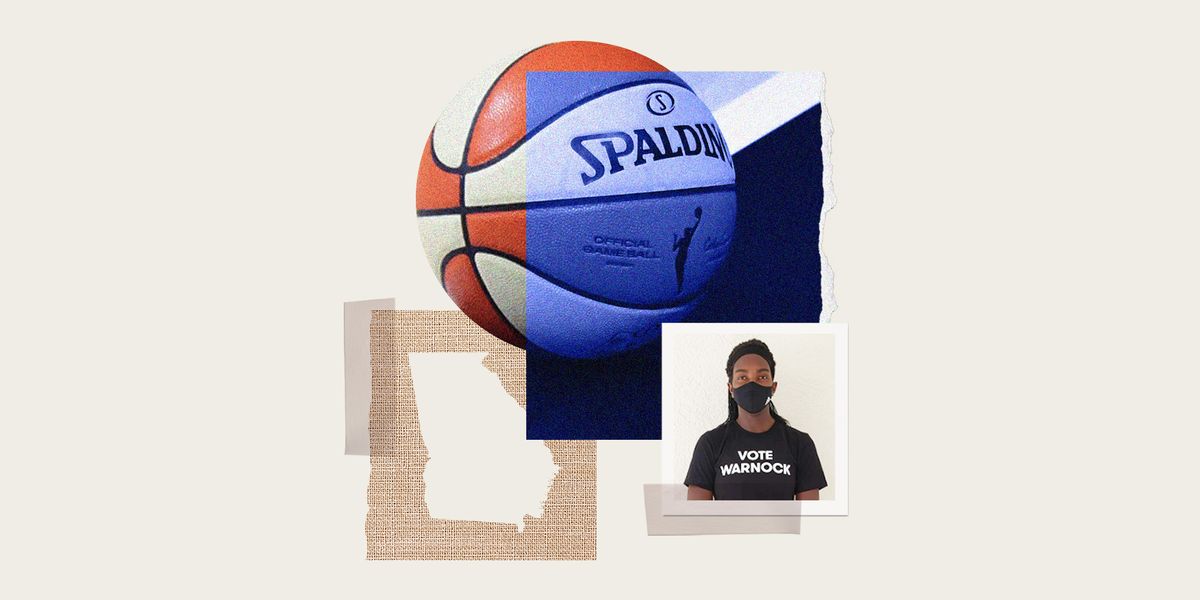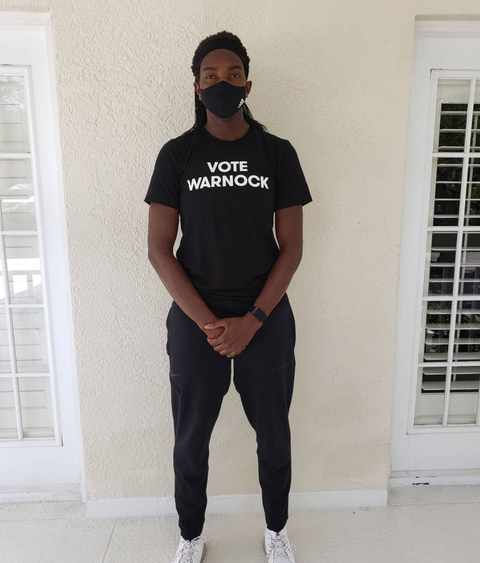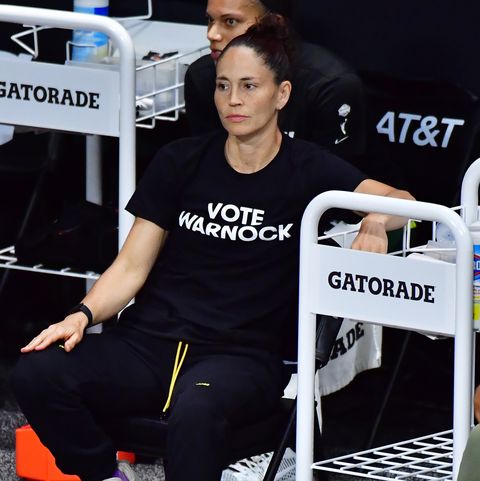Elizabeth Williams was 6,000 miles away the night Georgia turned blue. But even from Turkey, where she is playing during the WNBA off-season, the 6-foot-3 center felt the gravity of the moment—and the role she and other WNBA women had in making it all happen.
The Atlanta Dream superstar helped lead a league-wide players’ movement to unseat Republican Sen. Kelly Loeffler, who happens to be a co-owner of the WNBA team Williams plays for. For months, she listened as then-Sen. Loeffler assailed the Black Lives Matter movement and criticized the WNBA’s dedication to social justice. The rhetoric led to Williams and her teammates making a fateful decision to rebel against their boss.
The “mutiny,” as it was quickly dubbed, came at a crucial point in Georgia’s runoff Senate election that pitted Loeffler against Democrat Reverend Raphael Warnock. Their support was, as Warnock said, a “turning point in the campaign.” Within 48 hours, he picked up 3,500 new donors and raised an additional $200,000, according to Forbes.
When Warnock emerged victorious, his win helped tip the balance of power in the Senate to the Democrats.
“Female athletes are always underestimated,” Williams, 27, recently told ELLE.com via Zoom. “We are never going to be defined by what other people think we can do. We will always be defined by what we accomplish.”
Now Williams and the other members of the majority-Black WNBA wonder whether this powerful political mobilization—unseen before in professional sports—can become a blueprint for other athletes ready to take a stand.
Fighting for racial justice is in the WNBA’s DNA. Before a game in 2016, Minnesota Lynx players began speaking out about the death of Philando Castile, who was fatally shot by police outside of St. Paul. Their press conference ignited a summer of athlete-led protests and even inspired NFL quarterback Colin Kaepernick to take a knee one month later.
Since then, WNBA players have grown more emboldened and unified. Lynx star Maya Moore took a basketball sabbatical at the peak of her career in 2019 in order to push for criminal justice reform. A few months later, Natasha Cloud of the Washington Mystics staged a media blackout to draw attention to gun violence. Then, Cloud’s teammate Tina Charles donated her entire WNBA salary to the Black Lives Matter movement.
Last year, WNBA players formed a Social Justice Council to address issues like systemic racism. But not every front office was on board. Loeffler, who owns a 49 percent stake in the Dream, wrote a scathing letter to league commissioner Cathy Engelbert, arguing that a “particular political agenda undermines the potential of the sport and sends a message of exclusion.”
Sue Bird, one of the basketball’s biggest stars, saw a profound irony at work. “She didn’t want politics brought into sports, but she was actually the one bringing politics into sports,” the Seattle Storm player told ELLE.com. “She used players as pawns in her political game. But the louder we spoke out against her…the more she continued to stand up to Black Lives Matter supporters.”
As Loeffler doubled down, a coalition of players quietly fought back. First, by agreeing not to say her name out loud—not in press interviews, or during press conferences, or on social media. Then they began working with the Say Her Name Campaign to raise awareness for Black female victims of police brutality.
Still, many women in the WNBA knew that real change was needed in the corridors of power: Loeffler had to be voted out of office. In between practices, while Googling Loeffler’s political opponents, Bird came across Rev. Dr. Raphael Warnock, a pastor at Ebenezer Baptist Church in Atlanta, where Martin Luther King Jr. had once preached. His platform perfectly aligned with their mission.
Bird and other players helped organized two league-wide Zoom calls with the candidate. All, of course, while still playing professional basketball. As word about Warnock continued to spread around locker rooms, some members of the Atlanta Dream went public with their support, wearing black “Vote Warnock” T-shirts ahead of a nationally televised game against the Phoenix Mercury.
This content is imported from Twitter. You may be able to find the same content in another format, or you may be able to find more information, at their web site.
Basketball legend Sheryl Swoopes, who has been at the forefront of social activism for decades, watched in awe as it all played out. She was the first player drafted to the WNBA in 1996, just six weeks after giving birth. Five years later, she became one of the most high-profile athletes to come out as gay.
But this—this—was unlike anything she’d ever seen.
“Things are changing,” Swoopes told ELLE.com. “Players now see and know the power they hold as a collective. The fact that it is not only the Black players of the WNBA, but every player, is powerful. If we are going to see change in this country, it is going to take every single one of us, Black, white, brown and every other color, to speak up.”
In many ways, there was no looking back. The open support for Warnock set a new standard for “connecting the dots between social justice & voting,” as Democratic activist Stacey Abrams put it on Twitter. (Abrams, the political powerhouse credited with tipping Georgia to Joe Biden, also serves as an advisor to the WNBA players association board.)
This content is imported from Twitter. You may be able to find the same content in another format, or you may be able to find more information, at their web site.
Warnock’s win is a reminder of what athletes can do when they know how to use their platforms—and when they work together. The WNBA players created a new prototype for “future strategies of political activism,” Dr. Amira Rose Davis, an assistant professor of history and African American studies at Penn State and the co-host of the podcast Burn It All Down, told ELLE.com.
“We have certainly seen Black athletes entangled with politics in a variety of ways for much of the 20th century,” Davis said. “But the WNBA, with their majority Black players, were strategic, collaborative, relentless, and clear about their actions. They kept that same energy, even when few took notice.”
Now everyone in the sports world knows. When the league announced last week that a sale of the Atlanta Dream was “close to being finalized,” NBA star LeBron James threw his hat into the ring. There are reportedly four other bidders interested in owning the team, but Dream players have voiced their support for James. It makes sense. His voting rights group, More Than a Vote, helped voters get free rides to the polls in Georgia.
This content is imported from Twitter. You may be able to find the same content in another format, or you may be able to find more information, at their web site.
As the future of the Dream is ironed out, many WNBA players are focused on staying safe during the pandemic, while training for both the 2021 season and this summer’s Olympic Games. But Team USA Coach Dawn Staley, who will lead the women in Tokyo, says they will always find time for social justice.
“I don’t mean this in a bad way, but women just have more depth and sustained stamina than men do when it comes to fighting for issues,” Staley told ELLE.com. “Will the NBA ever have that same type of stamina? No, but that’s why you have the WNBA, to pick up the slack.”
Bird put it this way: “Women just know how to get shit done.”
This content is created and maintained by a third party, and imported onto this page to help users provide their email addresses. You may be able to find more information about this and similar content at piano.io


